The Central Committee of the Communist Party of China and the State Council's Opinion on Supporting Shenzhen in Building a Pilot Demonstration Area of Socialism with Chinese Characteristics proposes that "by the middle of this century, Shenzhen will stand among the world's leading cities with a more vigorous stance, becoming a global benchmark city known for its competitiveness, innovation, and influence." In his speech at the 40th-anniversary celebration of the establishment of the Shenzhen Special Economic Zone, General Secretary Xi Jinping emphasized that Shenzhen should establish an awareness of full-cycle management, accelerate the modernization of its urban governance system and capabilities, and strive to create a new path of governance that aligns with the characteristics and rules of megacities. To deeply research the Guangdong-Hong Kong-Macao Greater Bay Area and the pilot demonstration area of socialism with Chinese characteristics, and to support the construction of world-class city clusters and global benchmark cities, Shenzhen University's School of Government, Shenzhen University Institute for Global Megacity Governance, and Peking University Institute of Urban Governance jointly hosted the "Innovation for Global Urban Governance: Qianhai Forum (2024)".
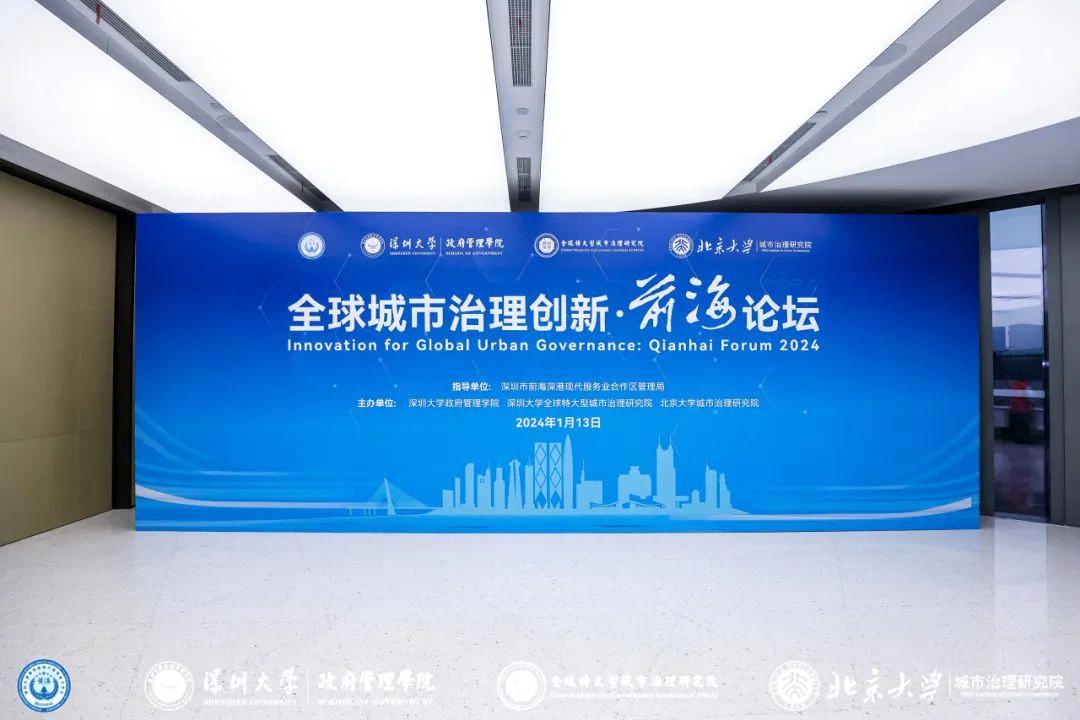
On the morning of January 13, 2024, the "Innovation for Global Urban Governance: Qianhai Forum (2024)" was held in the Harbor Lecture Hall of Qianhai International Talent Port, Shenzhen. The event was hosted by Shenzhen University's School of Government, Shenzhen University Institute for Global Megacity Governance, and Peking University Institute of Urban Governance. Attendees included representatives from Peking University, the Party School of the Central Committee of CPC, Sun Yat-sen University, Tongji University, South China University of Technology, Guangzhou University, Shenzhen University, Zhejiang Gongshang University, as well as international and domestic universities and think tanks such as the World Metropolitan Association, the University of Hong Kong, the Chinese University of Hong Kong, the City University of Hong Kong, the University of Macau, the Macau Polytechnic Institute, and the Macau Development Strategy Research Center. Over 100 guests from the Ministry of Civil Affairs' Policy Research Center, the Ministry of Housing and Urban-Rural Development's Department of Energy Conservation and Science and Technology, the Chinese Society of Social Governance, the Party Working Committee of the Qianhai Cooperation Zone, and other research institutions and government departments attended the forum to discuss global urban governance innovation, the construction of the Guangdong-Hong Kong-Macao Greater Bay Area, and the innovative development of Qianhai.
The opening remarks of the forum were hosted by Professor Chen Wen, Party Secretary of the School of Government and Executive Director of the Shenzhen University Institute for Global Megacity Governance. Wang Jinxia, a member of the Party Working Committee of the Qianhai Cooperation Zone and Deputy Director of the Qianhai Administration Bureau, highlighted that Qianhai's development is a vivid interpretation of Xi Jinping's Thought on Socialism with Chinese Characteristics for a New Era. Over the past 13 years, Qianhai has formed a series of domestically leading institutional mechanisms and governance innovations, integrating the implementation of national development strategies with innovative local governance practices in Shenzhen. Wu Baoshui, Deputy Secretary of the Party Committee of Shenzhen University, expressed gratitude to the leaders and experts for their guidance and welcomed their presence. He noted that the Shenzhen University Institute for Global Megacity Governance oversees several key research bases in humanities and social sciences at the provincial and municipal levels. In recent years, the institute has achieved over a hundred national and provincial research projects, producing high-quality research results in academic studies and policy recommendations. He hoped that the institute would seize the opportunity of settling in Qianhai to deeply participate in the development and construction of the Qianhai Cooperation Zone, providing intellectual support for the cooperation zone between Shenzhen and Hong Kong's modern service industries and the construction of the Guangdong-Hong Kong-Macao Greater Bay Area. Yu Keping, Dean of SZU’s School of Government, Director of the Institute for Global Megacity Governance, Chair Professor at Peking University and Peking University Institute of Urban Governance, pointed out that with the global urbanization rate approaching 60% and China's urbanization rate exceeding 65%, cities have become the primary spaces for production and life. The institute will focus on global governance of super large cities, aiming to build a high-end think tank and exchange platform for innovative urban governance research in the new era. The institute's presence in Qianhai will not only leverage its research advantages locally but also explore a new development model for local government-university think tank cooperation with the Qianhai Cooperation Zone.
Following the speeches, the unveiling ceremony for the Qianhai base of Shenzhen University Institute for Global Megacity Governance was held, along with the launch of the China Urban Governance Innovation Case Database and the "Global Governance of Super Large Cities Research Series," hosted by Professor Zeng Xianju, Director of the Social Science Department at Shenzhen University. Deputy Director Wang Jinxia, Deputy Secretary Wu Baoshui, Dean Yu Keping, Academician Chen Jun of the Chinese Academy of Engineering, and Professor Chen Wen and Professor Gu Zhijun of Shenzhen University's School of Government jointly unveiled the base and initiated the database and series compilation.
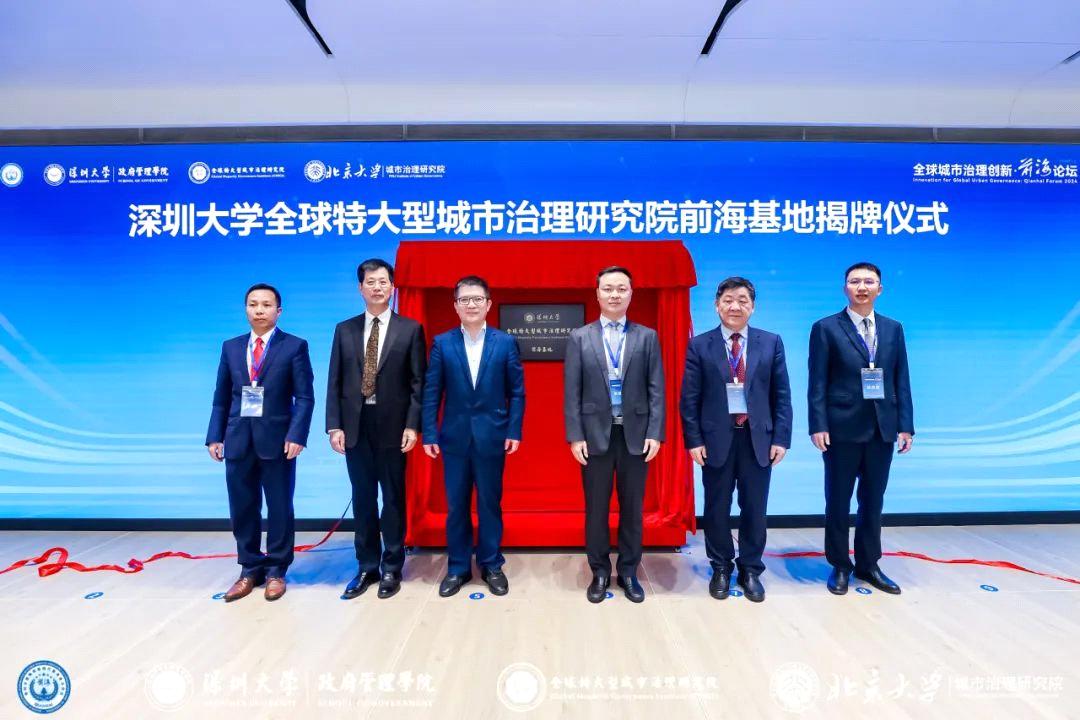
At the forum, the "Shenzhen Urban Governance Innovation Cases (2023)" were released, hosted by Professor Gu Zhijun, Vice Dean of the School of Government and Vice Director of the Shenzhen University Institute for Global Megacity Governance. The innovation cases were categorized into "Outstanding Cases" and "Nominated Cases." Certificates of honor were awarded to representatives of these cases by Yu Keping, Dean of the School of Government and Director of the Shenzhen University Institute for Global Megacity Governance, Chair Professor at Peking University, and Director of the Institute of Urban Governance at Peking University; Wang Jiexi, former Director of the Policy Research Center of the Ministry of Civil Affairs, President of the Chinese Society of Social Governance, and Dean of the Institute of Social Policy at Zhejiang Gongshang University; Geng Dehong, Vice Director and Secretary-General of the Institute of Urban Governance at Peking University; and Chen Wen, Party Secretary of the School of Government and Executive Director of the Shenzhen University Institute for Global Megacity Governance.
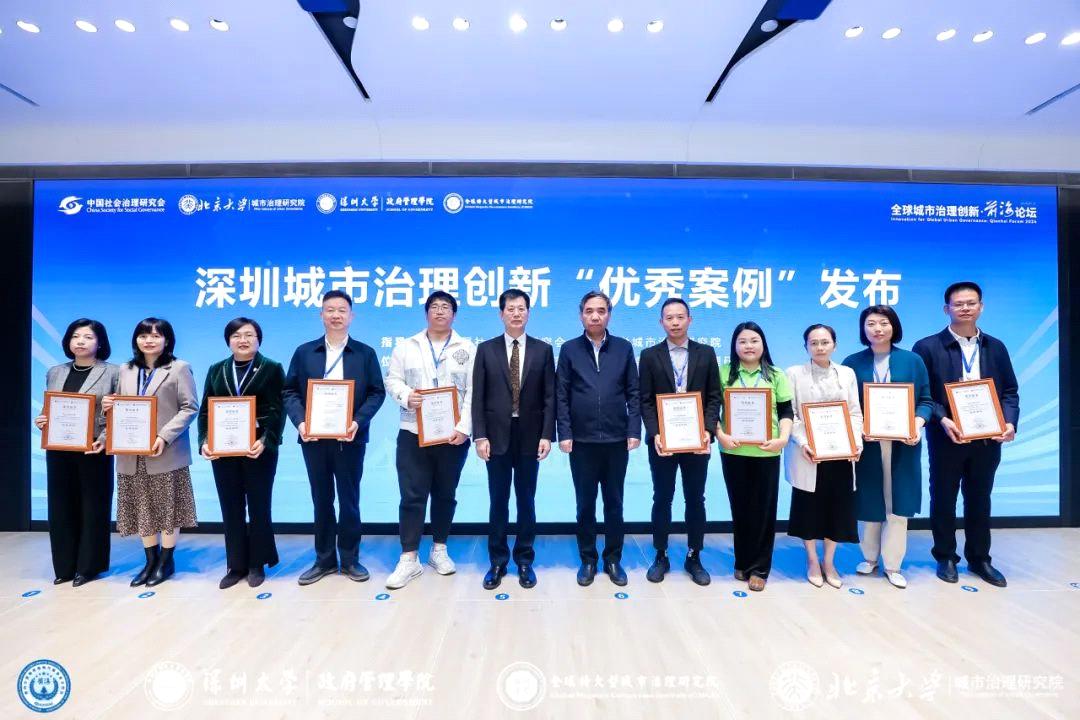
The keynote speech session was chaired by Sun Kuanping, Founding Vice Director of the Institute of Urban Governance at Peking University. Jordi Bakker, Secretary-General of the World Metropolitan Association, delivered a speech titled "Governing Growing Metropolitan Spaces," emphasizing that innovative urban governance must align with the scale of urban development. He noted that the current global urban scales can be divided into megacities and large urban clusters. While large urban spaces offer opportunities in innovation, culture, employment, and more, they also present challenges in living conditions, air quality, commuting times, and neighborhood safety. Improving the quality of urban life is now a crucial topic in urban governance research. Academician Chen Jun presented a speech titled "Utilizing Spatiotemporal Information to Tell the Beautiful China Story,” Highlighting that the construction of a beautiful China should be grounded in national spatial planning. He advocated for the innovative application of digital technologies such as remote sensing, spatial positioning, GIS, and AI to enhance urban spatial governance, perform spatiotemporal monitoring and evaluation, and overcome the limitations of fragmented and single-focused evaluations by different departments and regions. This approach enhances systematic research and comprehensive understanding of socio-economic and environmental development. Wang Jiexi, in his speech "Urban Disaster Risk Management in the Context of Climate Change," emphasized that the adverse effects of global climate change are intensifying, leading to frequent global disaster events. He called for modern disaster governance concepts, recognizing the importance of reducing natural disaster risks and the complexity and severity of urban natural disaster risks. He advocated for engineering measures to reduce vulnerabilities and improve overall disaster risk reduction capabilities. Guo Liqiao, former Deputy Director of the Energy Conservation and Technology Department of the Ministry of Housing and Urban-Rural Development and Vice Director of the Yangtze River Delta Sustainable Development Research Institute at Tongji University, spoke on "A Model for Paradigm Shifts in Urban Governance: The 'Water Town Living Room' Development Approach in the Yangtze River Delta Integration Demonstration Zone." He proposed that the Yangtze River Delta's pioneering construction of the "Water Town Living Room" serves as a pressure test for regional governance and collaboration, designed with principles of integration, high quality, innovation, and demonstration. This governance mechanism integrates ecological green penetration into resource optimization, creating a new "Water Town Living Room" governance model, achieving innovations in four areas: development along a near-zero carbon energy system, integrated development of key fields of carbon reduction and green low-carbon industries, development of an ESG big data platform for the area, and achieving pathways for park carbon neutrality, carbon finance, and sustainable park development. Xiao Zhiwei, President of the Macau Development Strategy Research Center, in his speech "Activating New Dynamics in Urban Governance System Reform and Promoting New Patterns of Regional Governance Innovation," stated that in a complex and volatile global situation, cities are accelerating their efforts to reform their governance systems. Under the national policy of "One Country, Two Systems" and within the context of the national development strategy of integrating into the Guangdong-Hong Kong-Macao Greater Bay Area, he highlighted the unprecedented innovation model of promoting Hengqin-Macao cooperation. This model involves the mechanism of “mutual consultation, mutual construction, mutual management, and mutual sharing, marking significant cooperative and innovative breakthroughs in the Greater Bay Area's key platform cooperation, driving the development of the Hengqin Guangdong-Macao Deep Cooperation Zone, and fostering comprehensive, systematic cooperation between Guangdong and Macau in the deep cooperation zone's development. Professor Hao Yufan, Vice Dean of the School of Humanities and Social Sciences at the Chinese University of Hong Kong (Shenzhen), in his speech "The Global Significance of Modernization of Urban Development in China," proposed that modern world history can be viewed as a global urbanization process. Cities have increasingly become micro-units of global regional development, with shifts in economic and political order following changes in urban economic power. The urbanization process also drives the global economic activity's shift from "the West" to "the East," significantly driven by China's reform and opening-up, which propelled the second round of globalization. This shift is evident in China's urbanization being a major driving force for world economic development, providing a non-Western development path for global urban governance at the institutional level, and helping the "Global South" complete urbanization transformation goals. For the future modernization of Chinese cities, Hao emphasized the need for a more open development concept, further internationalization of Chinese cities, adjustment of the "government, market, and society" relationship, creation of a service-oriented government, robust market, and dynamic society, all centered around "people," to drive the aggregation of wisdom, capital, and technology through the flow of people.
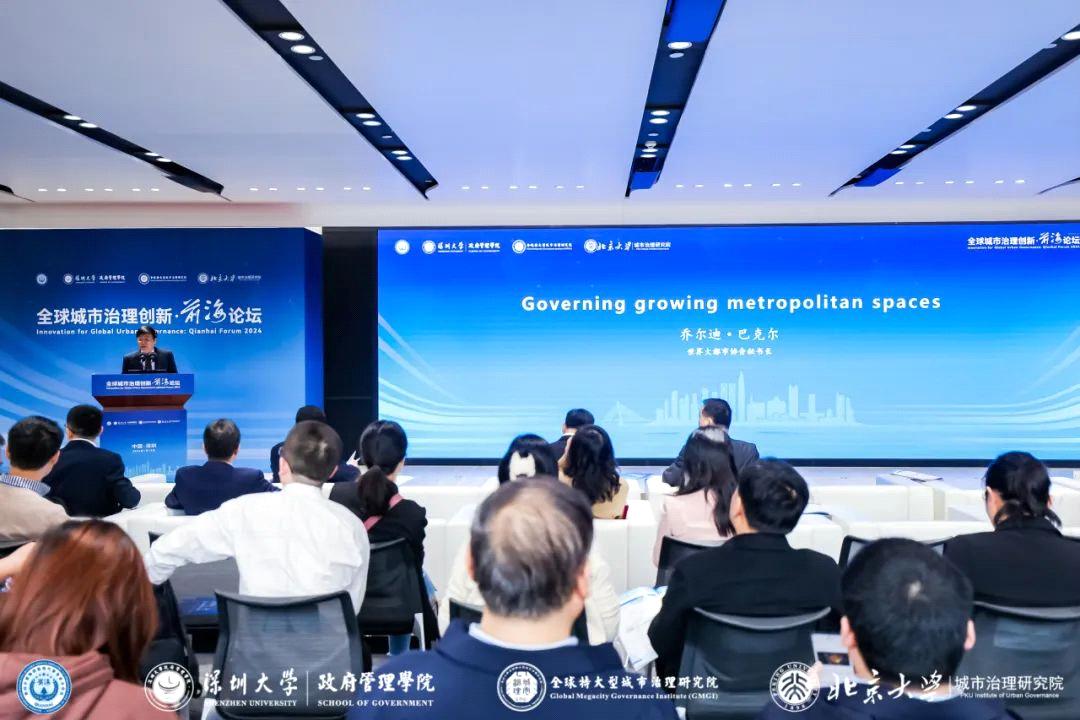
The fifth session of the forum featured the launch of the Greater Bay Area Urban Governance Innovation Research Network and a roundtable discussion, hosted by Professor Wang Changjiang, former Director of the Department of Party Building Research and tier-one professor at the Party School of the CPC Central Committee. The session began with the formal launch of the research network. During the subsequent roundtable discussion, scholars from the Guangdong-Hong Kong-Macao Greater Bay Area discussed cooperation and innovation in urban governance within the region. Dean Yu Keping suggested that the Greater Bay Area's urban governance has unique characteristics. He recommended that the founding institutions of the research network organize an annual roundtable forum, promote the selection of outstanding urban governance innovation cases, develop a research index for urban governance innovation in the Greater Bay Area, establish a database for urban governance innovation, and create a regular exchange mechanism among academic institutions in the area. President Xiao Zhiwei emphasized that high-level openness is a driving force for innovative urban governance in the Greater Bay Area. He noted that the launch of the research network would provide important intellectual support for the high-quality development of the region. Professor Li Shenghui, Dean of the School of Public Administration at South China University of Technology, stated that urban governance innovation research should be integrated into all aspects of urban development. He highlighted that the research network should leverage the research strengths of its founding institutions to form a cohesive research effort and promote technological innovation in urban governance. Professor Hu Weixing, Dean of the Faculty of Social Sciences at the University of Macau, pointed out the importance of focusing on smart city innovation. He discussed how the research network should explore innovative systems and mechanisms for shared governance among cities in the Greater Bay Area. Professor Zhou Limin, Vice Dean of the School of Public Administration at Guangzhou University, proposed that urban governance should be understood and promoted from the perspective of urban resilience. He advocated for enhancing infrastructure, economic, community, technological, environmental, and organizational resilience to drive urban governance innovation in the Greater Bay Area. Professor Lam Wai-Fung, Head of the Department of Politics and Public Administration at the University of Hong Kong, suggested that the founding institutions should strengthen the research network through joint projects, aiming to make a substantial impact on public policy. He also recommended collaborative urban governance training programs to expand the network's influence and to extend the scope of global urban governance innovation research. Professor Xu Jiang, Head of the Department of Geography and Resource Management at the Chinese University of Hong Kong, proposed establishing a youth scholars' research network to increase participation and activity within the research network. He stressed the importance of fostering deeper cooperation between Shenzhen and Hong Kong, ensuring the network is rooted in China while oriented towards the world. Professor Ho Tat-Kei, Head of the Department of Public and International Affairs at the City University of Hong Kong, highlighted that while Shenzhen leads in technological innovation globally, its achievements in urban and social governance innovation have not received adequate global attention. He suggested that the research network conduct comprehensive studies on various dimensions of urban governance innovation to share the remarkable stories of the Greater Bay Area with the world. Associate Professor Yin Yifen, Director of the Institute of Social and Economic Public Policy at the Macau Polytechnic Institute, noted that cross-system and cross-city governance are key areas for urban governance innovation research in the Greater Bay Area. He emphasized the need for increased communication and learning among local governments to share innovative governance practices and results.
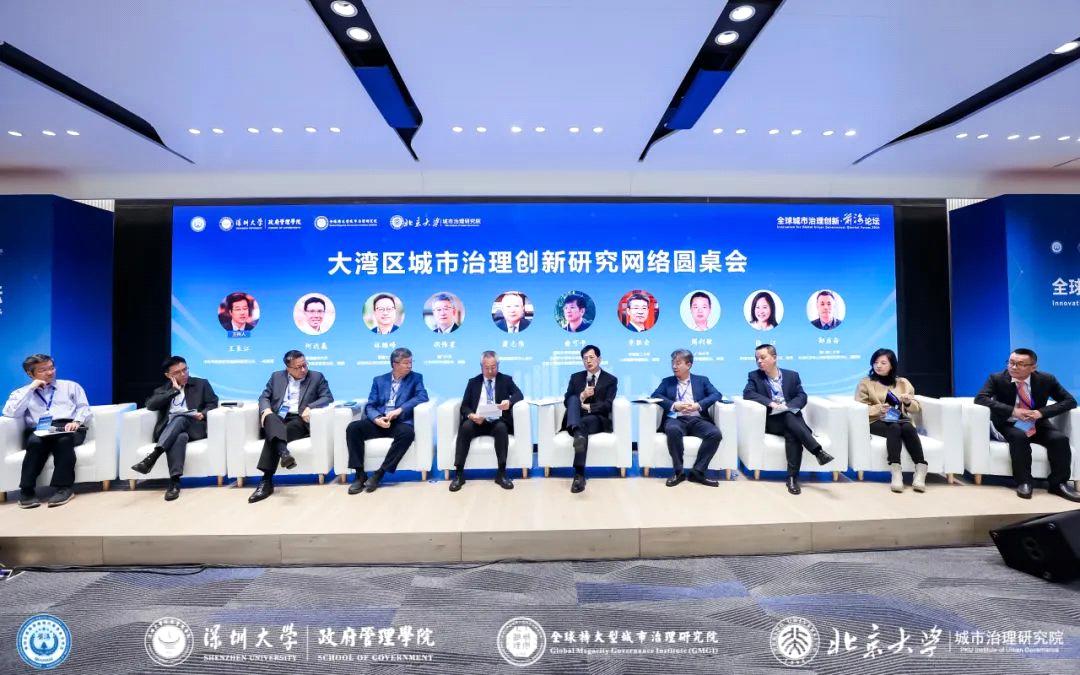
This forum is one of the brand academic activities initiated by the Shenzhen University Institute for Global Megacity Governance since it settled in Qianhai as a new type of think tank with Chinese characteristics. The forum aims to respond to the call for a new era of reform and opening-up, leveraging the advantages of Shenzhen's pilot demonstration area and the Guangdong-Hong Kong-Macao Greater Bay Area to build a high-end think tank and exchange platform for innovative global urban governance research.
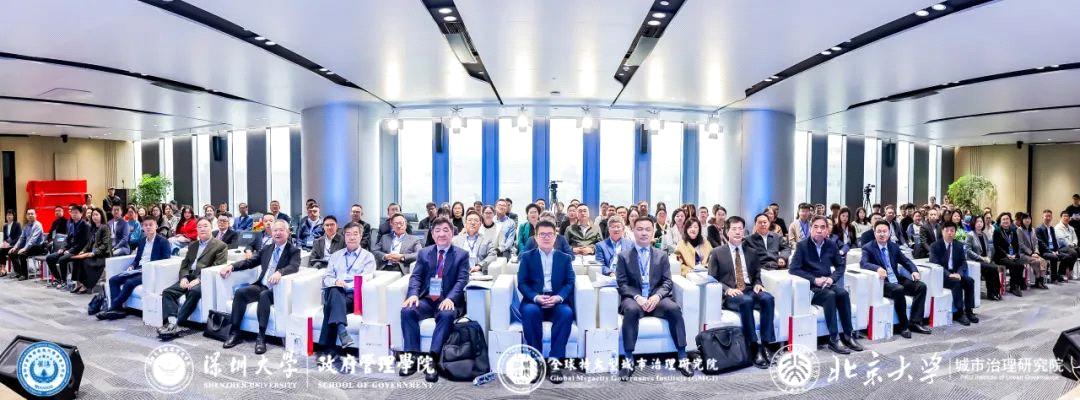
Editor: Yin Shun
First Reviewer: Yuan Chao
Second Reviewer: Feng Xiucheng
Final Reviewer: Gu Zhijun

